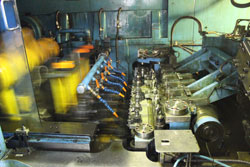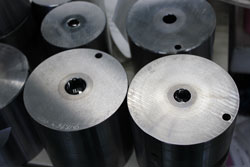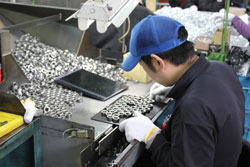Meet Japanese Companies with Quality
Cold forging Matsuda Corporation
Website: Matsuda Corporation![]()
Category: Japanese Machinery
Forging metal at room temperature
"Reuse" and "reduce" are concepts well understood by Osaka-based, cold-forging specialist Matsuda Corporation. Its technicians use efficient manufacturing not just to aid the environment but also save clients time and money. Cold forging is the process of forging metal without heat, at room temperature. Specifically, Matsuda specializes in forging fasteners, the nuts and bolts used in auto parts like intake manifolds and air cleaners.

The company president, Hidenari Matsuda

Cold forging in action-punches work on the metal over several stages
Steering away from crisis
CEO Hidenari Matsuda's father began cold forging hexagonal nuts in 1968. Matsuda junior then spent six years working for an equipment maker before joining his father's company in 1990 and eventually taking over. He recalls sensing at the time that his company was in danger. He knew it needed to adapt to changing times; overseas manufacturers were beginning to compete with Japanese companies on cost. Matsuda steered the company away from its vulnerable, standardized parts business to become a value-added manufacturer handling specialized parts, particularly low-lot production lines. The strategy paid off and the company managed steady growth, even after the bubble burst.
A total solution under one roof
The company couldn't completely escape the effects of the 2008 Lehman Brothers collapse, but Matsuda saw an opportunity. He purchased equipment, hired craftsmen and launched the in-house production of cold-forging molds. This meant he could offer customers a total solution under one roof-prototyping, mold creation and mass production. The business was thus able to reduce delivery time from several months to just one. And clients found that less time and less outsourcing also meant less cost.
While cold-forging comprises over 90 percent of business, Matsuda is hoping to push on with the firm's mold-creation activity, which currently accounts for the remaining 10 percent. He also wants to increase the company's capacity for machining high-precision parts.

The company produces its own dies that are used to shape parts such as nuts and bolts in cold-forging

Each finished part is subject to rigorous quality control
Reduce and reuse
Environmental and economical considerations are major concerns for Matsuda, particularly in reducing the amount of metal waste and conserving expensive and limited rare metals. Cold forging not only makes for stronger metal parts-as they've been shaped and compacted by force-it also generates less waste than conventional machining processes. Matsuda's company is also working on product life extension and cutting costs through reuse of the rare metals that make up the tips of its mechanical punches. His experts are also researching laser hybrid thermal spraying to repair punch tips worn away by intense use.
Matsuda already works together with a partner company in the area of overseas sales. But he hopes in the future to forge his way directly toward auto parts suppliers and other companies abroad.
Website: Matsuda Corporation![]()



